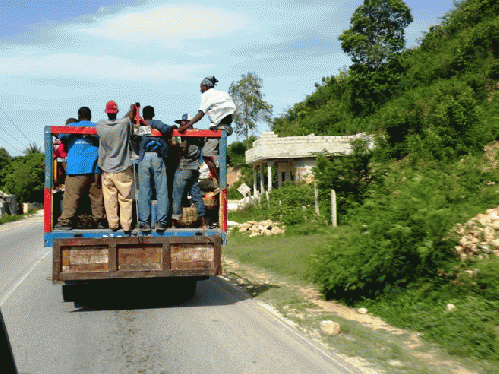********
Click here for Part 1 of this series.
Click here for Part 2
Click here for Part 3
Click here for Part 4
Click here for Part 5
Click here for Part 6
Click here for Part 7
Click Here for Part 8
Click here for Part 9
Click here for Part 10
Click here for Part 11
********
At the end of Part 11, we had just left Haiti's only functioning sugar mill, Usine Sucriere Jean Leopold Dominique de Darbonne, near Là �ogà ne, and were now heading northeast again toward Port-au-Prince, once again taking in the sights and sounds of Haitian life amidst the earthquake rubble all along the way. As I have said before, Haiti's hard-pressed citizens, perhaps a million and a half of them internal refugees after their homes and neighborhoods were heavily damaged or destroyed, live, eat and work right up to the edge of the roadways, and, as a matter of fact as you will see in some of the following photos, even beyond that.
Racing past palm trees
Driving through a town
Passing by New Hope English Institute, some type of small college it seems
Imagine your daughter having to tramp through this every day to go to school, multiplied many times over throughout the country.
As we approach the outskirts of Port-au-Prince, industrial sights greet our eyes.
We are actually passing by an electrical plant commissioned by Hugo Chavez and the government of Venezuela for the Haitian people.
During a trip to Haiti in early March of 2007, and after conferring with Renà � Prà �val, president of Haiti, and Cuban Vice President Esteban Lazo, who was also in the Haiti on an official visit, Hugo Chavez, the flamboyant president of Venezuela declared, to quote from the website Watching America:
"We've taken a giant step toward in the
realization of the Bolivarian Alternative (ALBA) for the Americas," Chavez let it be
known. The ALBA is a plan that is opposed to the Free Trade Area of the Americas, promoted by the United States.
"A new wave of people is rising in Latin America and the Caribbean," the Venezuelan president said with joy. "Those who wish to see this saw it in the streets of Port-au-Prince," he added. (source)
Chavez, in a speech to the Haitian people, who followed him around enthusiastically in large crowds, pointed out that Haiti had helped Venezuela during its struggle for independence:Chavez pointed out the historic bond between Venezuela and Haiti. "Here, [Francisco de]
Miranda (a Venezuelan hero), issued his first cry for Venezuelan
independence" on March 12th 1806, he underlined.
"We are conscious of where we are, conscious of what the Haitian people represent," asserted the Venezuelan President while recalling the assistance of the Haitian authorities toward the resistance that fought for Venezuelan independence in the early 19th century. (ibid.)
This prompted the Haitian president to respond thus:
(Note: You can view every article as one long page if you sign up as an Advocate Member, or higher).





